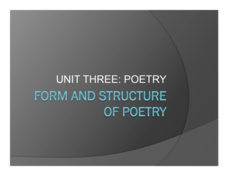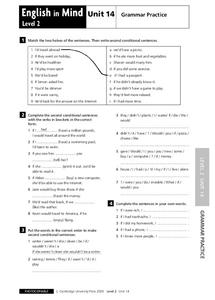EngageNY
Building Background Knowledge: The Myth of Cronus
Scholars look at and describe a picture of Cronus and Rhea and discuss the process of making predictions. Learners then use the images to write a prediction about the myth of the gods on an index card before completing guided reading...
EngageNY
Writing to Inform: Analyzing a Model Using a Rubric
Learn to write right. Scholars analyze the model essay Adversity Faced by Townspeople in the Middle Ages. They discuss the essay and make annotations working with an elbow partner. Learners then take another look at the essay using a...
EngageNY
Qualities of a Strong Literary Essay
Put it all into words. Scholars work toward writing an argumentative essay. They begin by examining and marking strong words in Are We Medieval? A Literary Argument Essay Prompt. Learners then use Qualities of a Strong Literary Argument...
EngageNY
Introducing World without Fish
One fish, two fish, red fish, no fish. Scholars analyze World without Fish to determine the gist, identify vocabulary, and answer text-dependent questions. As learners read, they use sticky notes to annotate the text. They also work in...
EngageNY
Tracing the Idea of Fish Depletion: Chapter 2
Scholars read chapter two of World without Fish to learn more about the fishing industry. Learners discuss in triads what it means for fishing to become an industry. They then write the gist of pages 28-33 on sticky notes and answer...
EngageNY
Analyzing Images and Language: Inferring about the Natural Disaster in Eight Days
Pictures often reveal different meanings. Scholars analyze the images in Eight Days and discuss how they add meaning to the text. Readers answers questions about how specific colors are used to create different emotions. Learners then...
Springfield Public Schools District 186
Form and Structure of Poetry
If anyone suffers from metrophobia—the fear of poetry—the PowerPoint on the elements of poetry may help alleviate their worries. The presentation introduces learners to poetic elements, including simile, metaphor, and personification....
Curated OER
The Language of Human Rights
Did you know that there are 15.2 million refugees in the world? High schoolers will read "The Universal Declaration of Human Rights" and learn how they can get involved to lower this surprising number. To really encourage involvement,...
Curated OER
Elements of Poetry
Prepare your learners to identify figurative language in poetry. Tips for reading poetry and what to look for are listed on these slides. Rhetorical devices are defined and plenty of examples are given.
EngageNY
Finding Evidence of Laurence Yep’s Perspective of the Police in Dragonwings
Perspective is everything. Using a graphic organizer, pupils determine Laurence Yep's perspective of the police in his novel Dragonwings. Additionally, scholars complete anchor charts to identify connotative language in the text.
K12 Reader
Adjectives Add Interest
A world without adjectives would be a sad place indeed! Make sure adjectives stay around by teaching your class about what they are and how using them can make a boring story truly interesting. Learners put this idea into practice by...
Curated OER
Persuasive Writing Skills Worksheets
What makes you want to buy that new car? Or vote for that popular politician? Study the persuasive techniques commonly found in advertisements or argumentative writing, including repetition, exaggeration, and fact vs. opinion.
Houghton Mifflin Harcourt
Nature: Friend and Foe: Extra Support Lessons (Theme 6)
Breaking down words into syllables has two benefits: it improves vocabulary and it improves understanding of a text. The third and final resource in a series of materials designed to be used with Nature: Friend or Foe offers extra...
University of North Carolina
Clichés
When it comes to writing, cliches are as old as dirt. A handout on tired phrases provides examples of cliches, as well as a description of the negative effects they have on a paper. Writers discover specific words and phrases to avoid,...
Smithsonian Institution
Water/Ways: The Poetry of Science
Water is the source of life. It appears in poetry in both peaceful and torrential descriptions; it appears in earth science in its liquid, gaseous, and solid states. Combine these interpretations of our planet's most precious and...
Montgomery Public Schools
Romeo and Juliet Study Packet
William Shakespeare's Romeo and Juliet, a play about star-crossed lovers, resonates deeply with teenagers. The study packet contains study questions for each act of the play. Learners use a graphic organizer to analyze whether characters...
Read Write Think
Persuasive Techniques in Advertising
Ever wonder if that miracle product in the commercial is really a miracle? Chances are, the only miraculous part is how many people the advertisers are able to convince to buy it! Class members look over short descriptions of techniques...
Curated OER
Reading the Play
Do figures of speech enhance a play or story? In small groups, learners locate and describe figures of speech they find while reading a reader's theater play. After making predictions, they describe how the figures of speech make the...
Curated OER
A Monster of a Metaphor
What do Jeep advertisements and Steinbeck's The Grapes of Wrath have in common? They both employ the art of the extended metaphor! Using the Six-Trait Writing model, learners begin to work on their own extended metaphors. Development...
Curated OER
The Learning Network: Fill In 2011 Commencement Speeches
Meant to be used with the article "Words of Wisdom" also available on the New York Times website, this resource contains a fill in the blank exercise where learners complete the article by supplying missing words. Use words from the word...
Curated OER
Use the New Internet Library for Adult Learners
Adult learners, examine the Internet to answer life skills, use an online dictionary, evaluate web sites and fill in online forms. They will also write about web sites in this series of activities.
Curated OER
English in Mind Unit 14: Grammar Practice
Use this grammar practice worksheet to have learners complete thirty fill in the blank and short answer questions related to conditional sentences.
Curated OER
Total English Elementary: The Best Thing is...
Given two nouns separated by an adjective, learners create eight sentences using the adjective in comparative form. Example: Jamaica/hot/UK, which becomes Jamaica is hotter than the UK. They then write the superlative form of eight...
Curated OER
Various Questions
A great exercise for English language learners or youngsters learning how to question, this resource provides practice using pictures to recognize words. After the class has completed the fill-in-the-blank portion, have them walk around...

























